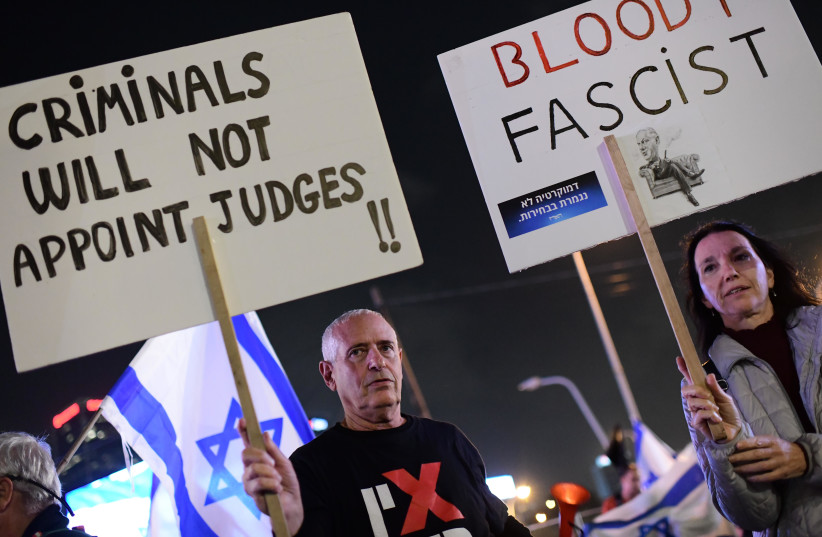Tens of thousands of Israelis held subdued protests against the government's judicial reforms on Saturday night, after seven Israelis were murdered and five more were injured in two separate shooting terror attacks in Jerusalem over the weekend.
The protests were held on Saturday night for the fourth straight week. Two central protests took place in Tel Aviv, one at Habima Square hosted by the Movement for Quality Government, and the other on Kaplan Street hosted by a coalition of protest groups.
Protests were also held outside of Prime Minister Benjamin Netanyahu's residence in Caesarea, outside of President Isaac Herzog's residence in Jerusalem, and in Beersheba, Haifa and other cities.
Many of the protests opened with a minute of silence out of respect for the seven lives lost in the deadly Jerusalem terror attack on Friday night.
"Last night's murderous attack in Jerusalem is heart-breaking. We share in the pain and grief of the families of the murdered and wish for the recovery of the injured," the protest organizers said in a statement.

Protestors also lit memorial candles at some of the sights. Opposition leader MK Yair Lapid attended the demonstration in Jerusalem and lit a memorial candle.
"We came here to Jerusalem to remind everyone that we are one people," Lapid said. "We stand as one front against terror. The government needs to decide if it wants to fight against terror or against Israeli democracy," Lapid said.
National Unity chairman MK Benny Gantz chose not to attend the protests, and instead visited the site of Friday night's attack in Jerusalem's Neve Yaakov neighborhood.
Yes to a Jewish state, no to a religious one
Protest leader and former defense minister and IDF chief of staff Moshe (Bougie) Ya'alon at the Kaplan Street protest equated the terror attacks outside of a synagogue to that of Jewish terrorist Baruch Goldstein's' massacre of Muslims at prayer nearly 30 years ago. Ya'alon argued that National Security Minister Itamar Ben-Gvir, who for many years had a picture of Goldstein in his living room, was unqualified to serve as the minister responsible for the police.
Ya'alon said he knew all four of the heads of Israel's security branches – the IDF, Shin Bet, Mossad and Israel Police – and that he trusted all of them.
"I have one demand of the government – don't get in their way," Ya'alon said.
The speakers at the Habima protest included former MK Collette Avital; Professor Hagai Levin, who is leading the "white robes" protest of medical practitioners; lawyer Tomer Naor, head of the Movement of Quality Government's legal branch; and Professor Yaniv Roznai, an expert of constitutional law at Reichman University.
Avital, a holocaust survivor, noted the fact that the world noted International Holocaust Day on Friday.
She dedicated the speech to her parents, who brought her to Israel to live in a free Jewish and democratic country.
"Jewish yes – halakhic state- no. Democracy – yes, autocracy – no," she said.
"The holy principles of human rights is the legacy of the holocaust," Avital said. "How is it that it is us, whose basic rights were taken, who contributed to the international bill of rights – how is it that we will be those who erase the Basic Law: Human Dignity and Liberty?"
